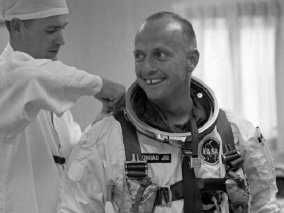Charles Conrad
Charles Peter Conrad, the third man on the moon, died on July 9th 1999, aged 69

Anyone interested in space travel can probably name Neil Armstrong as the first man to step on the moon 30 years ago, uttering the carefully scripted words, “That’s one small step for man, one giant leap for mankind.” Perhaps the name of his companion, Buzz Aldrin, may also come to mind. Charles Conrad, though, was in the second moon landing four months later, and for him memories have faded. Nice guys come last, as the cruel American aphorism puts it, or, in the case of Mr Conrad, third. He was a nice guy; everyone said that. A nicer man never put on a space suit. He could also be amusing, and this may have been one reason why he was not selected for the first moon trip.
Going to the moon was a very serious undertaking: only a successful landing would justify the colossal amount of money spent on space research and, most important, would put one over on the Russians, who had sent up the first satellite and whose Yuri Gagarin had been the first person to circle the earth in a spacecraft. Neil Armstrong was serious to the point of shyness, and was preferred as leader of the first moon trip even though Buzz Aldrin had had more experience in space.
But Mr Conrad was a wild card. During his training as an astronaut he had made light of the physical and psychological tests that spacemen had to endure. He scoffed at attempts to probe his mind, and was convinced that the medical staff had an unhealthy obsession about enemas. When the diminutive (5ft 6in) Charles Conrad made his first step on to the moon, his slightly mocking words were, “Whoopee! Man, that may have been a small one for Neil, but that’s a long one for me.” There were more shudders among the space people when Mr Conrad appeared in a television advertisement for the American Express bank. “Do you know me?” he said. “I walked on the moon.”
Those who did know Charles Conrad had a high regard for his competence. Getting off the ground, he said, was a family tradition: his father had been a balloonist observing enemy lines in the first world war. Father had come down to earth and had made a fortune as a stockbroker, providing Charles, or Pete, as his parents called him, with a privileged childhood. The 1930s were the heroic days of flying. Mr Conrad remembered assembling crates and chairs to resemble the aircraft in which Charles Lindbergh had made the first solo non-stop flight across the Atlantic, “then sit inside it for hours pretending to fly”.
He studied aeronautical engineering at Princeton and made a career as a navy airman. In the early 1960s he was taken on for training by America’s space agency. In the fragile contraptions that first took Americans into space, Mr Conrad’s small stature and light weight were great assets. Waiting for lift-off, he recalled, you had fears “just like bullfighters have fears of being killed by the bull”, but once you started “it’s all business” because that is what keeps you alive.
The Apollo craft, called Intrepid, that took Mr Conrad to the moon provided him with business that no one had expected. A minute after lift-off the craft was struck by lightning, and all the warning lights in Intrepid began to flash. Mr Conrad declined to abort the mission and carried on to make a perfect landing on the moon. He and his companion, Alan Bean (who now became the fourth man to walk on the moon), spent nearly eight hours there. Mr Conrad returned with what he called “the world’s greatest cold”. They also collected bits of moon rock and took lots of pictures (but mislaid a spool of film,presumably still on the moon). Neither these souvenirs nor those collected on the first moon flight seemed much to show as a return on the costly investment. But getting to the moon cheered up America, and but for the clever engineering involved we might not have gadgets such as the mobile phone. So be grateful.
Mr Conrad never went to the moon again, although there were four more successful missions. Twelve people in all have walked on the moon, all of them American. Mr Conrad did take part in extended space flights, one of them lasting for 28 days. To him, space was just another workplace. He did not see his moon trip as a religious experience. Those that did, such as James Irwin, who later led six expeditions to Turkey in search of Noah’s Ark, were, said Mr Conrad, religious before they went, and remained religious when they got back.
He predicted that, not too long in the future, there would be tourist flights into space, providing the costs could be kept down with reusable craft. There would be plenty to see. The earth, he said, resembled “a beautiful blue marble suspended against a black velvet blanket”. Space was healthy, he said, colds aside. He never suffered any ill effects from his space travels: he died in a motor-cycle accident.
Mr Conrad was asked whether there was life in other worlds. He said there probably was. “After all, there’s plenty of unearthly looking things moving around in my refrigerator, so there’s always a chance of life springing up almost anywhere.” He liked a joke, did Charles Conrad.